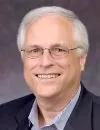It was a big day for the Asai family in Tokyo back on April 12. The father of the family, Kiwamu, graduated with his Master of Business Administration (MBA) while his son, Itaru, received his associate’s degree in preparation for studying for a bachelor’s degree in criminal justice at City University of New York (CUNY).
Both men are part of the University of Maryland Global Campus (UMGC) Class of 2025 and just two of the countless lives transformed by the university’s Bridge Program, which enables Japanese nationals to improve their English language skills enroute to U.S.-style higher education or employment.
Sitting side-by-side in their academic regalia for an interview, they grinned and patted each other on the back as they talked about their UMGC experiences. It was Kiwamu’s second UMGC graduation. The first had been 28 years earlier.
“That's 25 plus years being out of school and being in a professional life,” he said. “So, that required a lot of refreshers and learning a lot about the academic fundamentals, as well as a lot of business knowledge that I can apply in real life really quickly.”
Kiwamu found that the learning process had changed dramatically since he earned his associate’s degree from UMGC in 1995. He had graduated from high school in the United States and was fluent in English so he was immediately admitted to UMGC, taking in-person classes with U.S. military students stationed at the Yokota Air Base near his home.
After completing the Bridge Program, he transferred to the University of Colorado at Boulder, where he graduated two years later.
When Itaru graduated from high school, Kiwamu encouraged his son to follow the same path—entering the Bridge Program and earning an associate’s degree that would prepare him to finish his education in the United States. Itaru said he is glad he took his father’s advice, and, they both laughed.
For Kiwamu, this time around there was no in-person classroom work; everything unfolded online. After receiving help getting started, he learned the advantages of online learning with students from all over the world. Now in his early 50s, he had wondered before starting the program if he was too old to pursue an MBA. He soon learned it was never too late to go back to school
“I got support from professors during the coursework, as well as care from the other students,” he said. “A lot of our classwork centered around projects, and so I worked with a lot of great people in my team. There was a lot of peer support, a lot of learning from what they brought to the class. It was a diverse background of people, many from the military, from government, as well as, like myself, from business.”
Kiwamu said he was grateful to the State of Maryland for offering global programming that is accessible to people who have been out of school or who are changing careers.
“It's never too late to start going back to school and getting the degree. But it's always good to do it with a family member so that there's a little bit of a peer pressure,” he said, grinning at his son. “We are grateful to UMGC, its faculty and staff, and U.S. forces in Japan for providing opportunities to obtain higher level education for both my son and me here in Japan.”
To celebrate, father and son headed out for sushi. Itaru had been in New York—he’d flown back to Tokyo for the graduation ceremony—and he looked forward to celebrating with real Japanese food again.
